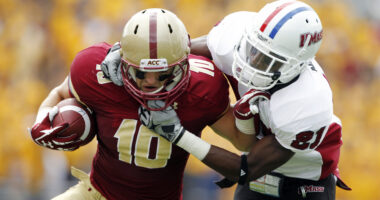Jump to the main content

The National College Players Association (NCPA) lodged a complaint with the U.S. Department of Education last month, claiming that the compensation restrictions imposed on players infringe upon the civil rights of black athletes.
Additionally, these actions are a continuation of the NCPA’s previous assertions that numerous college athletes ought to be recognized as employees.
College athletes are losing thousands annually due to compensation limits
Legislation has been enacted in numerous states, requiring college athletes to receive compensation for the use of their names, images, and likenesses (NIL). Consequently, student-athletes are now able to generate income through avenues such as advertising, autograph sales, and endorsements.
Massachusetts legislators have been slow in addressing the issue of NIL laws, which allow athletes to earn income. However, Senator Barry Finegold has proposed a legislation that aims to bring the state up to speed on this matter.
According to him, the bill he proposed aims to guarantee equal protection for college athletes in Massachusetts, similar to states that have already enacted NIL legislation. This would safeguard their interests in the event that the NCAA alters its regulations down the line.
Despite the existence of laws in certain states, the NCPA complaint asserts that athletes are not adequately compensated for their true value due to the absence of official salaries.
According to the NCPA’s complaint, college athletes, who are classified as “non-employees,” receive inadequate compensation that falls short of their deserving earnings, which are estimated to be around:
- FBS football players earn an annual salary of $185,000.
- Division I men’s basketball players earn an annual salary of $164,000.
- Female basketball players in Division I earn an annual salary of $24,000.
The market value of college players is the foundation for these numbers, as determined by the NCPA.
College athletes risk big and earn little
The #JforJustice Campaign for College Athletes raises awareness about the unfairness in the way universities profit from their athletes without adequately compensating them.
The campaign emphasizes that college sports organizations, despite generating significant revenue for both universities and the NCAA, unfairly collude to deprive us of a fair share of these earnings.
#JforJustice argues that college athletes are exposed to significant risks such as severe injuries, fatalities, and sexual abuse due to the absence of properly enforced health and safety regulations.
Data concerning the physical injuries and risks endured by college athletes is enumerated on Change.org.
- Between 2000 and 2018, the recorded number of deaths among college athletes stands at 85.
- A significant injury related to college sports will be experienced by 66% of Division I college athletes.
- After their college sports career, approximately half of college athletes will experience chronic injuries.
- Around 50% of athletic trainers at the collegiate level have revealed experiencing pressure from higher authorities to allow athletes with concussions to resume playing.
Black college athletes suffer a disproportionate impact
According to a recent study published in The Antitrust Bulletin in 2021, it was revealed that black players participating in Power 5 conferences might be deprived of more than $1 billion in annual salaries. This estimation takes into account NCAA scholarships and equates to an average of approximately $250,000 in earnings per player per year.
Between 2005 and 2019, the study concluded that black players experienced a collective loss of $17.3 billion in earnings.
Ted Tatos and Hal Singer, the study’s authors, highlighted the presence of societal inequalities within college athletics.
According to the authors of a Global Sports Matters op-ed, the economy of college sports mirrors the widespread inequality found in society, with numerous instances of structural racism.
According to the latest complaint filed by the NCPA, compensation limits within college athletics are argued to contribute to the persistence of racial inequality.
“Black college students, who also happen to be college athletes in significant numbers,” stated the NCPA, “are disproportionately affected by the industry-wide compensation limit.”
How student-athletes benefit from employee status
At present, a considerable number of college athletes are classified as “amateurs” and consequently do not receive any official salary. Despite the fact that certain players generate revenue through NIL profits and scholarships, this is not applicable to every student-athlete.
College players are fairly compensated through an annual salary when they are acknowledged as university employees.
In addition to receiving monetary compensation from the university, college athletes gain a significant advantage by being recognized as employees, which grants them the right to engage in collective bargaining.
The failure of the NCAA to safeguard their non-employee athletes has been brought to light by the #JforJustice campaign, shedding light on the perils associated with college athletics.
According to the campaign’s petition details page, the NCAA actively enforces rules that prohibit athlete compensation. However, it is important to note that the NCAA does not have specific regulations in place to address instances of sexual abuse or dangerous workout sessions resulting in the death of a college athlete.
Collective bargaining rights would grant college sports players the opportunity to negotiate equitable wages, as well as other labor safeguards concerning their well-being and security.






